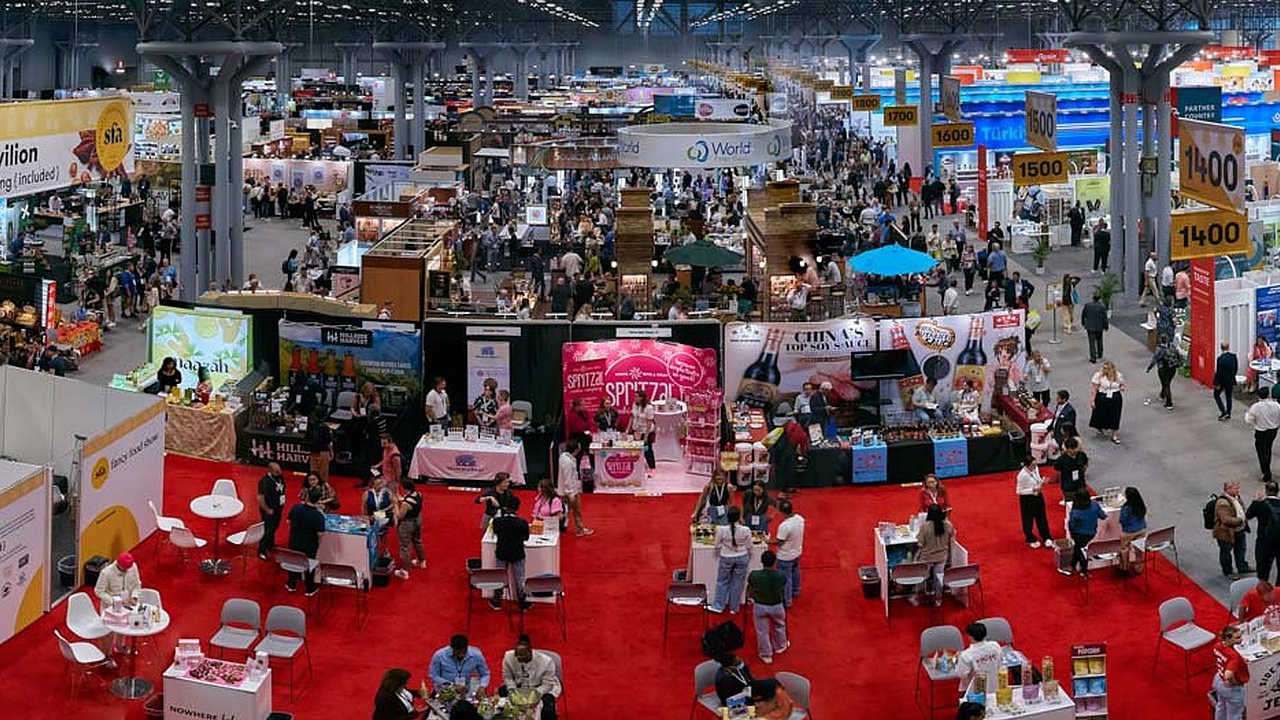The Specialty Food Association (SFA) hosted eight students from the Drexel Food Lab/Certificate in Food Entrepreneurship and Innovation program during the 2023 Summer Fancy Food Show, June 25-27 at the Javits Center in New York City. These future food industry professionals served as Junior Trendspotters, identifying products and flavors that will influence the food industry in the months ahead.
The following Drexel Food Lab students, under the guidance of Chef Rachel Sherman and Dr. Jonathan Deutsch, served as Junior Trendspotters:
- Gabe Thayer
- Adam Gladstone
- Victoria Sanchez Galarza
- Gabriel Marchiony
- Janis Niv
- Rodaina Ahmed
- Cynthia Huang
- Natalia Lopez
- DeAndra Forde
The Summer Fancy Food Show is the largest specialty food industry event in North America, and this year’s Show featured more than 2,200 exhibiting companies and more than 100,000 high-quality, artisan food and beverage products.
“While we teach food product development in an engaging and hands-on way at Drexel, nothing beats the experience of being immersed in the landscape of thousands of specialty food products from around the world, from artisan and traditional to high tech and new. The students are not only emerging professionals in the food industry, but also the target market for many of the brands at the show. There was a very meaningful exchange among students and exhibitors regarding careers, taste preferences, and the future of the food industry. It was a joy to watch and a pleasure to experience. The Junior Trendspotters developed their trend report independently of the “Senior” Trendspotter panel and I’m fascinated by the overlap in some areas and unique perspectives in others.”
“The Junior Trendspotter selections are not only on target with the prevalent themes at the Show but also have wide appeal to the younger consumer demographic these trendspotters represent,” said Denise Purcell, vp, resource development for SFA. “Gen Z is increasingly exploring the sober-curious movement, embracing plant-based alternatives, and demanding global flavor and ingredient experiences in their everyday meals and snacks. We expect to see more products related to these trends hitting store shelves and menus in the coming year.”
The Summer Fancy Food Show Junior Trendspotters identified the following top trends:
- Frozen International Foods: The frozen section has gone international, and consumers can now explore new cultures and cuisines from all over the world in the comfort of their own home. Khazana’s Nepalese momos, Alexandra Food’s Polish pierogis, Chef Bombay’s Indian samosas, Dumpling Daughter’s Chinese dumplings, and more: one person can make a whole buffet using just a microwave. Snacks are also an increasingly popular medium of introducing international flavors, such as Mochidoki’s black sesame mochi ice cream. It’s an effortless way to be introduced to a new culture and potentially foster interest in learning more.
- Infused Honey: Following the ever-growing push to steer away from refined sugar, honey has become increasingly popular as a seemingly healthy, natural alternative. Assorted flavors of infused honey are becoming more widely available and enable consumers to add an increased depth of flavor to their food. Whether people want a spicy kick, a subtle herbal tone, a fragrant floral note, or something bright and fruity, they can easily find almost any flavor they can imagine being sold in the market. Barreled Bee, Honey Blossom, and Savannah Bee Company are just a few of the many companies bringing more unique flavors to the market.
- Crunchy Snacks: Healthier snacks have been taking over the market with a twist, crunchy snacks. The versatility of the ingredients to create these snacks has been innovative and highlighted sustainability. Yolélé fonio chips are made with the ancient West African grain, fonio, that is sustainably grown and gluten-free. Another example includes Yuca Balls made of cassava focusing on agribusiness and healthy eating as well as Barnana plantain scoops, rind and all. The assorted use of various spices and ingredients makes this trend one that everyone can find a favorite snack.
- Mocktails: Tired of feeling lethargic after drinking or just wanting to take a break from alcoholic beverages? This is the time to try new mocktail recipes utilizing alternatives ranging from vinegar based shrubs, cocktail bitters, low-calorie mixers and numerous zero-proof options. The innovative brand Sayso launched the first ever mocktail tea bag using natural dehydrated ingredients creating an infused low-calorie/sugar drink in only a few minutes of steeping. A local Pennsylvania farm is where Bluestem Botanicals came to be as they invite us to “Drink your garden!” via their handcrafted organic mocktail kits making it easier than ever to be alcohol-free. Fauxmosa created alcohol-free mimosas for drinkers who want to be more mindful of both their alcohol and calorie intake with only 100 calories per can. All of these options show the continuously growing trend of being sober while not compromising on the taste and still feeling included during social gatherings.
- Improved plant based alternatives: I can’t believe it’s not (insert animal based product here)! Plant based alternative products have come a long way recently, in terms of both quality and variety. There’s a plant-based version of almost every single protein now, including tuna, pork, beef, and chicken, and oftentimes it is truly hard to tell that they aren’t the genuine article. The sheer breadth of plant based milks is staggering, ranging from the commonly seen almond milk to much newer concepts like Wholly Nuts’s pistachio milk and Milkademia’s macadamia milk. Following that trend, plant based ice creams such as from Nutty Bunny are rising in popularity, and they are just as creamy and tasty as the traditional dairy based ice creams. Armored Fresh’s almond milk cheese is as melty in a grilled cheese as the real thing. Whether for religious, ethical, or health reasons, people who avoid animal based products have an ever increasing arsenal of delicious foods they can enjoy.
A full Trendspotter Panel report from the Summer Fancy Food Show can be found online.
The next Fancy Food Shows are the 2024 Winter Fancy Food Show, January 21-23 at the Las Vegas Convention Center, and the 2024 Summer Fancy Food Show, June 23-25 at the Javits Center in New York City. Open only to food industry professionals, the Fancy Food Shows require registration and qualification. For additional information visit specialtyfood.com.
About Specialty Food Association (SFA)

The not-for-profit Specialty Food Association (SFA) is the leading membership trade association and source of information about the $194 billion specialty food industry. Founded in 1952 in New York City, the SFA prides itself on being an organization by the members and for the members, representing thousands of specialty food makers and manufacturers, importers, retailers, buyers, distributors, brokers, and others in the trade. The SFA owns and operates the Fancy Food Shows—which are the largest specialty food industry events in North America—as well as the sofi™ Awards—which have honored excellence in specialty food and beverage annually since 1972. The SFA produces the Trendspotter Panel annual predictions, the State of the Specialty Food Industry Report, Today’s Specialty Food Consumer research, the Spill & Dish podcast, year-round educational programming for professionals at every stage in their business journey, and SFA Feed, the industry’s go-to daily source for news, trends and new product information. Find out more online and connect with SFA on Facebook, Twitter, Instagram, LinkedIn, and TikTok.
About Drexel Food Lab

Drexel Food Lab in Drexel’s College of Nursing and Health Professions at Drexel University in Philadelphia is a food product design and culinary innovation lab that applies culinary arts and science to improve the health of people, the planet and economies. We do this through research and programming that help us understand consumers, develop new food products, and introduce new products to market. In doing so, we not only develop new food products and menu items with entrepreneurs, industry, non-profit, and government partners, but also develop our flagship “product,” graduates across disciplines who are poised to improve the food system. Students in the lab also enroll in the Certificate in Food Entrepreneurship (undergraduate) or Certificate in Food Innovation (postgraduate) to develop the skills they need to bring their own ideas to market.


